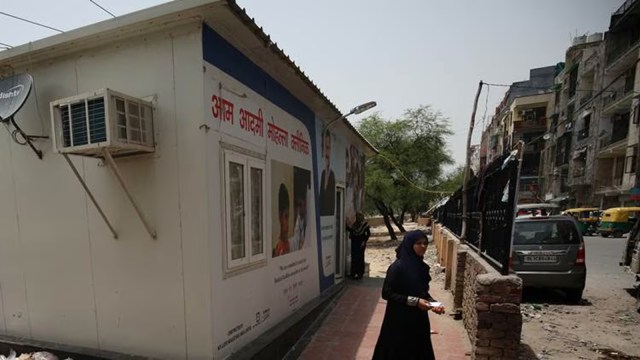After record high in 2023, footfall in mohalla clinics fell 28% last year
Stakeholders say drug shortage the primary reason; data shows clinics are far more popular among Delhi’s women.
 The decline, health department officials, doctors and experts say, is primarily due to a drug shortage that the mohalla clinics faced last year. (Express Photo by Praveen Khanna)
The decline, health department officials, doctors and experts say, is primarily due to a drug shortage that the mohalla clinics faced last year. (Express Photo by Praveen Khanna)After unprecedented footfall in 2023 — 1.94 crore visits by the citizens of Delhi — the Capital’s mohalla clinics saw a 28 per cent dip in 2024 to 1.39 crore appointments, an application filed under the Right to Information Act and official documents sourced by The Indian Express have revealed.
The decline, health department officials, doctors and experts say, is primarily due to a drug shortage that the mohalla clinics faced last year.
Mohalla clinics, the centrepiece of the Aam Aadmi Party government’s health infrastructure, were first set up in October 2015. Since then, the clinics, which are meant to be the first point of contact for patients with basic illnesses, have caught the attention of many from across the world, including former Secretary-General of the United Nations, Kofi Annan, who wrote a letter to Chief Minister Arvind Kejriwal praising the project.
The Capital has 546 mohalla clinics spread across 70 assembly constituencies. A senior official from the state health department said more than 60 per cent of doctors there are women, which provides a sense of comfort that encourages women patients to visit.
Data accessed by The Indian Express testifies to this — since 2019, the number of appointments by men has been 2.42 crore, while for women, this figure is 3.02 crore. In fact, more women have visited mohalla clinics every single year since 2019 [see box].
According to RTI data, 2019 saw 15.14 lakh consultations by men and 20.53 lakh by women, but the numbers dipped in 2020 and 2021, the Covid years. However, 2022 saw a surge – 52.36 lakh consultations by men and 68.34 lakh by women.
This figure rose even further in 2023 – 85.85 lakh consultations by men and 1.08 crore by women. That trend changed in 2024, though, as mohalla clinics saw 64.17 lakh consultations by men and 75.48 lakh by women, a decline of 25.2 per cent and 30.5 per cent respectively compared to the previous year.
Stakeholders say a drug shortage at the clinics is the primary factor. In September 2024, The Indian Express reported from three government hospitals and six mohalla clinics in Southeast, East and West districts and found a shortage of essential drugs — meant to be available for free to patients — across the board.
The key reason was non-payment of vendors and a change in tender conditions, as a result of which two-thirds of the companies didn’t participate in the tender process this financial year. To put the crisis in context, at the time of reporting, only Rs 5 crore had been spent to procure medicines from the essential drug list this year — a far cry from Rs 164 crore in the financial year 2023-24 and Rs 247 crore the previous year.
While larger hospitals could navigate the crisis by procuring the drugs from local vendors, albeit at a higher cost, mohalla clinics and smaller hospitals faced a more dire situation.
The silver lining
Health department officials say they remain optimistic that the dip in 2024 is a blip and the footfall will continue to increase. They also highlighted what they say is the clearest success of mohalla clinics – the overwhelming preference by women.
Doctors and health experts The Indian Express spoke to said women have been accessing five key health services – for diabetes, hypertension, hypothyroidism, pregnancy-related issues, and seasonal issues such as flu and cold. “Among elderly women, knee and generalised pain are two common issues,” said a doctor, adding that women also visit for issues related to the menstrual cycle, post-MTP care, family planning and counselling.
“We provide hormonal tests and medicines and also run anaemia programmes where we provide weekly iron and folic acid supplementation,” said the doctor.
“The treatment, diagnosis and consultation are free, compared to private healthcare where the costs are high. Mohalla clinics provide social security to women who often do not have the freedom to spend on themselves,” said another doctor.
Explaining the post-pandemic surge in numbers, a senior official from the state health department said that in 2022, the Delhi government opened around 100 more mohalla clinics. “During the pandemic, we started conducting Covid tests as well, which brought more people from the vicinity, more importantly women. Later, even immunisation programmes started at the clinics, including Covid vaccine,” said the official.







